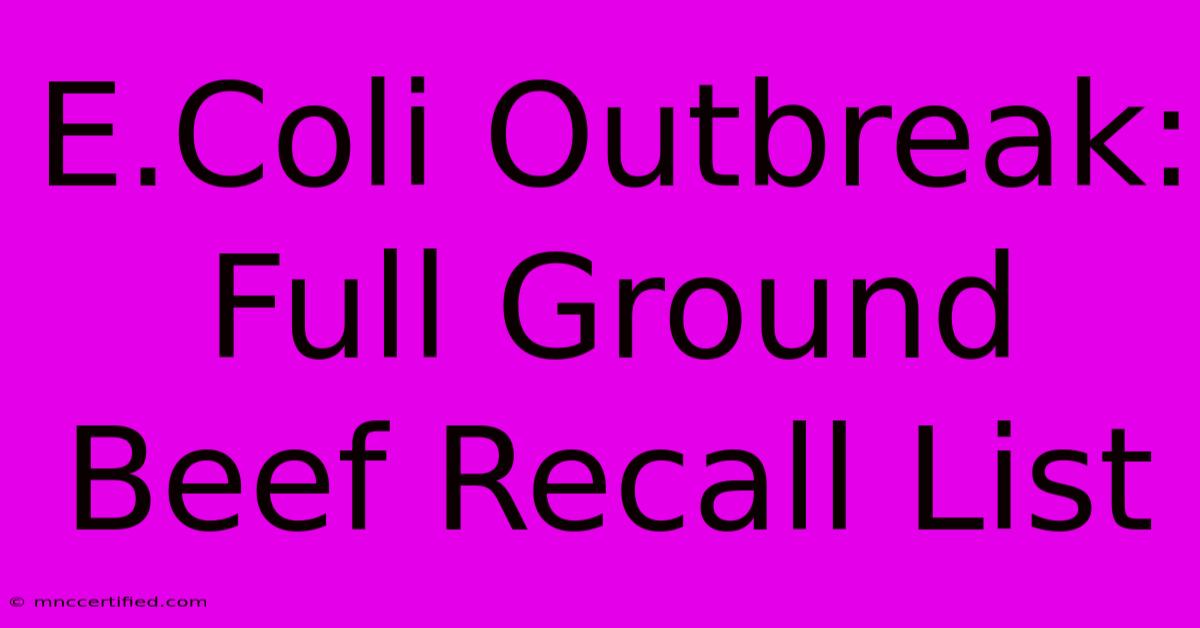E.Coli Outbreak: Full Ground Beef Recall List

Table of Contents
E. coli Outbreak: The Complete Guide to Recalled Ground Beef
An E. coli outbreak linked to contaminated ground beef can be a serious public health threat. Understanding the details of a recall, including which products are affected, is crucial for consumer safety. This article provides a comprehensive guide to navigating E. coli ground beef recalls, offering tips on how to stay informed and protect yourself and your family. We'll focus on providing information on identifying recalled products and understanding the risks associated with E. coli contamination. Note that this is not an exhaustive, real-time list of recalls – always check official sources for the most up-to-date information.
Understanding the Dangers of E. coli Contamination in Ground Beef
E. coli (Escherichia coli) is a type of bacteria that can cause food poisoning. While many strains are harmless, some, like E. coli O157:H7, produce toxins that can lead to severe illness. Ground beef is particularly susceptible to contamination because the grinding process can spread bacteria from the surface to the interior of the meat.
Symptoms of E. coli infection can range from mild diarrhea to severe complications, including hemolytic uremic syndrome (HUS), a life-threatening condition that can cause kidney failure. Children, the elderly, and individuals with weakened immune systems are at higher risk of severe complications.
How to Identify Recalled Ground Beef Products
During an E. coli outbreak linked to ground beef, the USDA's Food Safety and Inspection Service (FSIS) issues recalls. These recalls usually involve specific brands, product codes, and "use or sell by" dates. It's crucial to carefully check the packaging of all ground beef products you purchase.
Here's what to look for:
- Recall notices: The FSIS publishes recall notices on its website (fsis.usda.gov) and often issues press releases announcing major recalls.
- Product labels: Pay close attention to the brand name, product code, and "use or sell by" date printed on the package. These details are crucial for determining if your ground beef is included in a recall.
- Retailer notifications: Grocery stores and supermarkets often post recall notices in their stores or online. Check your retailer's website or contact customer service if you have concerns.
Where to Find the Most Up-to-Date Recall Information
The most reliable source for information on E. coli ground beef recalls is the USDA's Food Safety and Inspection Service (FSIS) website. Their website provides detailed information on recalled products, including images, product codes, and establishment numbers. You can also sign up for email alerts to receive notifications about recalls.
Other helpful resources include:
- Your local health department: They can provide information about outbreaks in your area.
- Major news outlets: Reputable news organizations frequently report on significant food recalls.
What to Do If You Have Recalled Ground Beef
If you discover that you possess ground beef included in a recall, do not consume it. Follow the instructions provided in the recall notice. This usually involves discarding the product or returning it to the store where it was purchased.
Do not attempt to cook the recalled ground beef. Cooking may not kill all the bacteria.
Preventing E. coli Contamination
While recalls are essential, the best way to protect yourself is to practice safe food handling techniques:
- Cook ground beef thoroughly: Ensure the internal temperature reaches 160°F (71°C) to kill harmful bacteria. Use a food thermometer to check the temperature.
- Wash your hands: Wash your hands thoroughly with soap and water before and after handling raw meat.
- Sanitize surfaces: Clean and sanitize all surfaces that have come into contact with raw ground beef.
- Separate raw meat: Keep raw ground beef separate from other foods to prevent cross-contamination.
By staying informed, following safe food handling practices, and utilizing reliable resources, you can significantly reduce your risk of E.coli infection from ground beef. Remember, timely action is crucial in protecting your health and the health of your loved ones. Always refer to official sources for the most accurate and up-to-date recall information.

Thank you for visiting our website wich cover about E.Coli Outbreak: Full Ground Beef Recall List. We hope the information provided has been useful to you. Feel free to contact us if you have any questions or need further assistance. See you next time and dont miss to bookmark.
Featured Posts
-
Steelers Vs Browns Tnf Prediction And Odds
Nov 22, 2024
-
Adani Faces Us Fraud Charges
Nov 22, 2024
-
Vicar Coles Heads To The Jungle
Nov 22, 2024
-
Ellen Portia Exit Us Amidst Reports
Nov 22, 2024
-
Gaetz Drops Out Of Ag Nomination
Nov 22, 2024